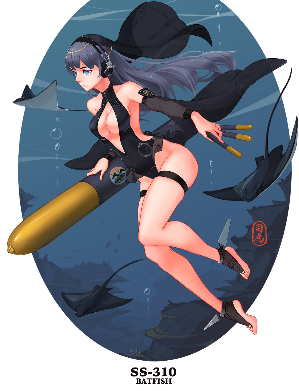Tautog here. We’ve got a two-parter talking about historical sub design, but before I go into that K9 wanted me to talk a little bit about general principles behind submarines.

So, as I said before. Submarines do a lot of things. Their main job is pretty obvious – sinking ships, but they also run cargo, lay mines, recon areas, secretly land troops, and even help with shore bombardment. If you’ve got a job for a ship that can stay hidden, chances are, a submarine’s done it before.
During the cold war, submarines got additional jobs. While they were used to scout before, the newer generation of submarine allowed for a lot more information gathering, like trailing enemy submarines, taking pictures of coastlines, and intercepting enemy transmissions. The cold war also saw the rise of the ballistic missile submarine. Those subs carry nuclear missiles – think of them as a moving but invisible missile silo, and you’ll quickly see why they’re strategically important.I’m sure Cusk has more to say about this topic later.
As you can see, submarines are an indispensable part of any navy. You definitely won’t see them going away (like the battleship, heh) anytime soon! The take home message here, though, is that submarines can do something no other ships do, and that’s to do things while staying hidden. Whether they’re acting as an invisible missile silo or a silent hunter beneath the seas, a good submarine is very difficult to find for the enemy, and that’s one of its biggest advantages.
So, it’s no surprise then that a lot of technology goes towards keeping a submarine stealthy. But, think about this for a second. Stealth isn’t everything. For a submarine to attack anything, it must throw off its “cloak.” In other words, once a submarine attacks a target, it in effect discards its greatest advantage, and thereby renders it vulnerable to counterattack.
Given that submarines are very poorly armored, it gave submarine commanders an interesting dilemma. Do I risk my safety so I can be aggressive and go on the attack? Or is it better for me to stay hidden until I can make a “safer” attack, but possibly at the cost of the attack’s success?
Submarine commanders had to deal with this particular trade-off because so much of what they do depended on it. In fact, you look at all the great submarine captains of all countries in the war, and you’d say that a lot of them had a thing for danger. To be an effective submarine captain you had to be aggressive, and you had to be willing to put yourself out there.

But, if you were too effective, you’d probably end up on the bottom of the ocean floor. That’s the deadly game that submarines play more so than any other ship type. The ones that are really good knew when to call it quits and “cashed out” their successes before too many enemies showed up. They also had a sense for when the risk was worth it – and when it was not.
Historically, prior to World War II, the US trained its submariners almost exclusively in matters of self-preservation and caution. Stealth and evasion and avoidance was what was emphasized. In fact, during pre-war war-games and exercises, if a submarine was so much as spotted by a plane, that sub counted as “sunk” in those exercises!
Yeah. So, before the war, the submarine was supposed to approach stealthily, minimizing one’s periscope exposure and rely on passive sonar. This made sense at the time, because the only times where a submarine would be easily detected would be right after its attack. The wake of the torpedo, the tell-tale signs of the periscope, or even the most obvious – the wreckages, which may or not be on fire – that the submarine left behind. All of those are pretty good signs that a submarine was nearby. It took many years and many developments in modern technology to make it so that we can get better at picking out submarines before they attack, but that’s another tale for another time.
What we found out was that this just wouldn’t do the job. U.S. submariners learned very quickly that the best way to do things was to attack on the surface at night. Yeah, sounds crazy, right? Well, they’d have gotten reprimanded before the war for such recklessness, but it was what ended up working really well.

Right, of course. I had almost forgotten. You’re here for cute subgirls in bikinis too.
Here’s who I’ll be introducing you to next. She’s pretty quiet, so don’t expect her to be as social as me!
Or, maybe she’s the next one? Gah, I need to check my schedule again. Everyone’s been drawn at this point. We’ve got twelve new subgirls –
*mutters* Stupid swimsuit calendar…
for the book, so, hmm…
Wait, hold on. If Bats and Pam and Lori are in, I gotta go check if Frenchie is around, too. Okay, be back in a bit!
